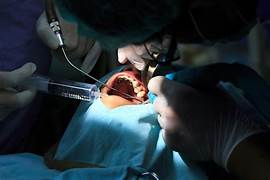The word “surgery” often brings to mind a stay in the hospital, general anesthesia, and perhaps a lengthy recovery period. However, the experience of having oral surgery is usually very different from that. Oral surgery is often performed in a dental office setting, under local anesthesia, with minimal recovery time. Oral Surgery can range from routine procedures such as tooth extractions and implant placement to more complex jaw realignment surgeries and emergency care for facial trauma.
Oral Surgery Procedures
Oral surgery procedures may be performed to relieve pain, treat an infection or trauma, restore function or improve a person’s appearance. Procedures and conditions treated include:
What to expect
Before your oral surgery is performed, x-rays will often be taken to aid in diagnosis and treatment planning. A step-by-step explanation of the procedure along with your anesthesia options will be discussed, and you should feel free to ask any questions you have. Your recovery experience will depend on what procedure you are having as well as your general state of health. It’s always important to let your healthcare providers know what medications you are taking (both prescription and over-the-counter), any chronic health conditions you have, and whether you smoke. This will help ensure your safety and comfort – always the paramount concerns.




